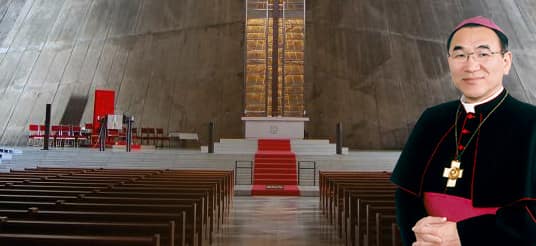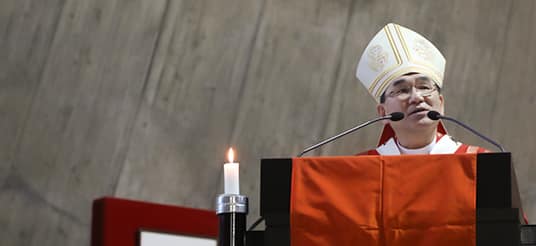Archdiocese of Tokyo

Homily for the Feast of Saint Lorenzo and Companions
28 September 2011, Franciscan Chapel Center
Dear brothers and sisters in Jesus Christ.
Today we celebrate the feast of San Lorenzo and his companions.
Saint Lorenzo Ruiz is the first Filipino saint. He was martyred on September 29, 1637, in Nagasaki, Japan for refusal to renounce his faith, during the persecution of Japanese Christians under the Tokugawa Shogunate in the 17th century.
Lorenzo Ruiz was born in Binondo, Manila, of a Chinese father and a Tagalog mother. Ruiz served as an altar boy at the convent of Binondo church. After being educated by the Dominican friars for a few years, he married and had two sons and a daughter with Rosario, a native. Life for them was generally peaceful, religious and full of contentment.
In 1636, while working as a clerk at the Binondo church, Ruiz was falsely accused of killing a Spaniard. Due to the allegation, Ruiz sought asylum on board a ship and left for Okinawa.
Soon after arriving to Japan, the missionaries were arrested and thrown into prison. The next year they were transferred to Nagasaki to face trial by torture. On September 27, 1637, Ruiz and his companions were taken to Nishizaka Hill, where they were tortured by being hung upside down in a pit. Ruiz refused to renounce Christianity and died from blood loss and suffocation.
With 15 companions Lorenzo Ruiz was beatified in Manila on February 18, 1981, by Pope John Paul II during his papal visit to Manila, the first beatification ceremony held outside the Vatican. San Lorenzo Ruiz was canonized by Pope John Paul II in the Vatican City, Rome, on October 18, 1987 with 15 companion martyrs.
According to the homily of Pope John Paul II during the beatification Mass, Lorenzo Ruiz told the court:
Even if I had many thousands of lives, I would offer them all for Him.
Never shall I apostatize.
You may kill me if that is what you want.
To die for God, such is my will.
The holy gospel according to John says:
Whoever loves his life loses it,
and whoever hates his life in this world
will preserve it for eternal life.
There are two kinds of words which express “life” in the original Greek.
One is “psyche” and the other is “zoe”.
When Jesus says “Whoever hates his life in this world”
that “life” in this world is “psyche”.
And when he says “will preserve it for eternal life”
that “life” is “zoe”.
Jesus said: “Now this is eternal life, that they should know you, the only true God, and the one whom you sent, Jesus Christ.” (John 17:3)
Let us pray that, by the intercession of Saint Lorenzo Ruiz and his companions, we may come to know our Lord Jesus Christ better and better.
Amen.





